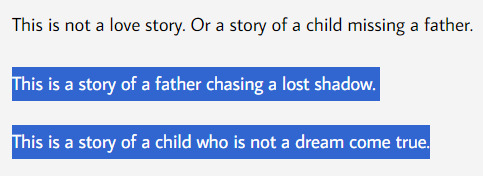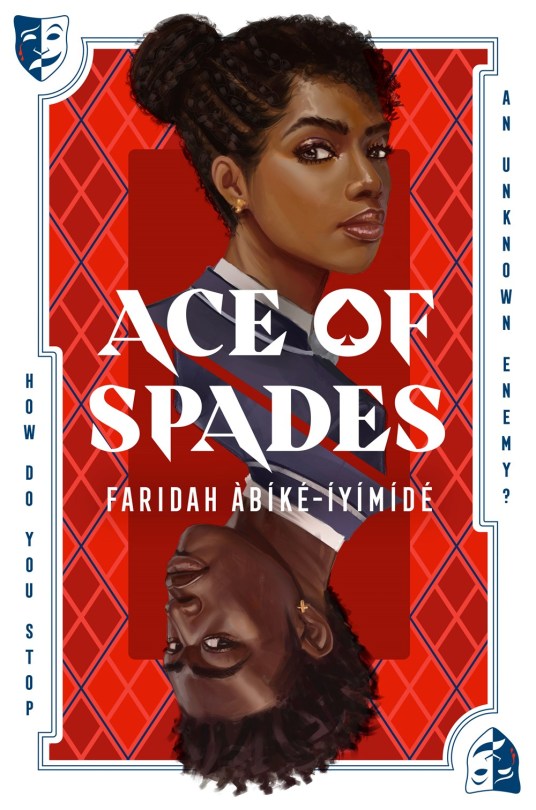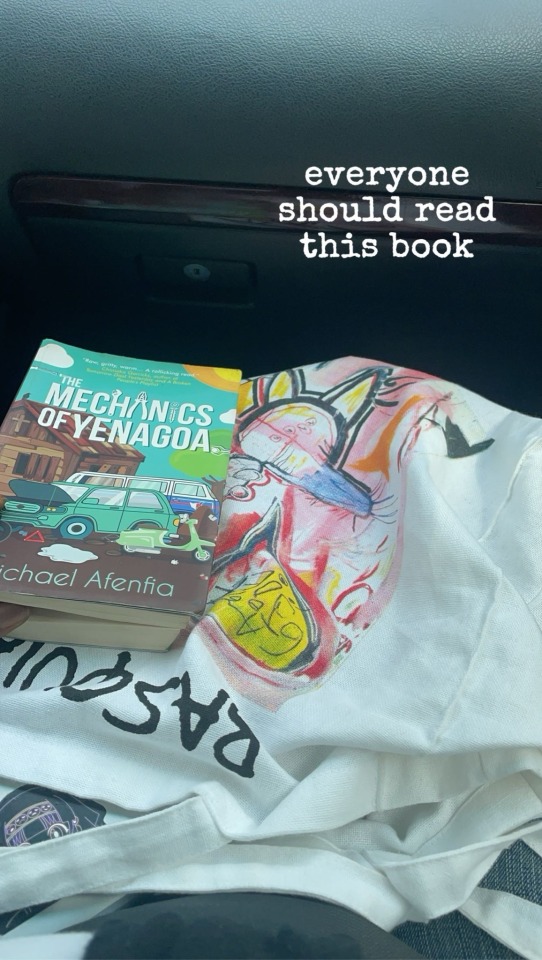#nigerian literature
Text

"The Woman with a Thousand Stars in her Hair" is available to read here
#short stories#short story#the woman with a thousand stars in her hair#ayodele olofintuade#nigerian literature#black literature#21st century literature#english language literature#have you read this short fiction?#book polls#completed polls
11 notes
·
View notes
Text
Once you let people know anything about what you think, that's it, you're dead. Then they'll be jumping about in your mind, taking things out, holding them up to the light and killing them, yes, killing them, because thoughts are supposed to stay and grow in quiet, dark places, like butterflies in cocoons.
Helen Oyeyemi, The Icarus Girl
#Helen Oyeyemi#The Icarus Girl#thoughts#mind#private thoughts#keep your thoughts to yourself#butterflies#ideas#Nigerian literature#Black literature#BIPOC author#quotes#quotes blog#literary quotes#literature quotes#literature#book quotes#books#words#text
10 notes
·
View notes
Text
"I Anoint My Flesh (Tenth Day of Fast)" -- Wole Soyinka (b. 1934)
I anoint my flesh
Thought is hallowed in the lean
Oil of solitude
I call you forth, all, upon
Terraces of light. Let the dark
Withdraw
I anoint my voice
And let it sound hereafter
Or dissolve upon its lonely passage
In your void. Voices new
Shall rouse the echoes when
Evil shall again arise
I anoint my heart
Within its flame I lay
Spent ashes of your hate --
Let evil die.
#personal#poem#poetry#Wole Soyinka#African literature#African poetry#Nigerian literature#Nigerian poetry#20th century literature#20th century poetry#inspirational
45 notes
·
View notes
Text
A LITERARY MASTERPIECE : DISCOVERING NEVER TO LOVE AGAIN

A unique story which transcends between friendship, love, hope and uncertainties that accompany the journey of an average Nigerian girl and her struggle to keep her commitment to the love of her life. This literal work of art, written and published in 2004 by American based Nigerian author Ngozi Onyegbule has its setting in two very contrasting places : A small intimate town in the Eastern Nigeria , and United States of America. In this novel of 18 chapters, Onyegbule, was able to deliver an African fiction in English, that promotes the culture and tradition of Nigeria just like some remarkable diaspora Nigerian based authors; the likes of Buchi Emecheta and a few others. As its name depicts , this is a story of a vow made from experiencing the rough side of westernization.

SUMMARY
Never to Love Again is a fictional story that centers on a young beautiful girl by name SYBIL AFOR, who falls in love with a promising young teacher KENNETH NKWO. Sybil, the last child of her strict and disciplined parents, gets into a committed relationship with Kenneth: the handsome, sweet and caring part time soap supplier of her mother.
These two characters go through several phases to keep their relationship glued in hope to get married someday. Their many years of friendship and commitment is thrown into new and complex trials which comes with Sybil’s move to further her study abroad. Though a struggling and underpaid young teacher, Kenneth quiets his plans to study law abroad, and channels his finances and energy, to complete the traditional marriage rites for his soon-to-be bride, and also reward her with a rich send-off party.
Sybil arrives the western soil, and is faced with pressure from her sister, college roommate, and the environment around her to follow the path she has ventured into: coming to America, and forget about the old path : Kenneth and their commitment. After much thinking and deliberation, Sybil drops the bombshell of breakup on Kenneth by letter, who receives it with shock and horror. Karma strikes the face of Sybil as she is asked to leave her school and the country after she was found ineligible to matriculate. Meanwhile on the other side of the world, Kenneth prepares to leave his home country, to study law. This leaves a heartbroken and deported Sybil in regret. But alas! a ray of hope appears for their relationship as Sybil receives admission from another school to start over again. Though the novel ended in a declined mood, there seems to be a sunrise to their relationship in the sequel “LOVE FORGIVES ALL SINS”
THEME: The novel has various themes laced in it, which would be of great interest to diverse readers. Some dominant themes are : Love, Peer-pressure, Doggedness, Respect, Cultural practices. And some sub-themes like : Independency, Friendship, Discipline, Courage, Fear, Early Detection can also been found. With makes it a jungle of many emotions and thoughts.
SETTING: Employing different places and cultures, the general setting of the novel is the late 20th and early 21st century. The movement of the characters also juggle from the western setting to the Nigerian setting.
PLOT: The plot, which is very much arranged and beautifully intertwined, graduates into the themes, characters and setting. So it’s safe to say that the plot is well planned.

ANALYSIS
CHARACTER DEVELOPMENT: The rise and use of each character, shows that the author, carefully thought of each one, and their role-play before infusing them to the plot. The main/ round characters which are Sybil, and Kenneth,touched every aspect of their role with precise and accurate details. There are some stoic and flat characters who played their role perfectly without absorbing change like : Victoria Sybil’s sister, Rosario Perez, Anthony, Bethrand and host of others.
LANGUAGE AND WRITING STYLE : The author employs the use of Narrative and Descriptive style to tell this story. The use of figure of speech is also dominant, and it can be seen is some examples like :
“one hundred feet long” ( line 3,page 124) which is used to describe the veil of a bride.
“All hands were on deck” (line 2,page 122)
“Marching to the altar” ( line line 5,page 119)
“Small lord” ( page 101) .
The author also makes use of the Omniscient point of view style to illustrate the various aspects of the book.
STRENGTHS: The greatest strength of Never too Love Again, is its accuracy and powerful illustrations of the people’s cultural practices, the different ways people see or accept the cultural practice amongst them. The fact that a lot of people would be able to relate to this story because of its authenticity and it vibe, is a major strength of this book.
When you line the background and personality of the author with his fictional work of art, you would see that the author has had ample experience of both cultures, so it’s safe to say he knows what he is writing about.
WEAKNESS: The dominant weakness of this book, it’s in its typesetting. The absence of quotation marks in this book, is what makes it weak. This makes it harder for readers to differentiate between the characters speech from normal writing. This is a major weakness because it would take a longer process to read and accumulate.
IMPACT: Never to love again, has recorded significant progress and awards in United States, due to the diasporic nature of the author. But discoveries that are about to be made about this novel, would soon throw it into National archives and collections.

CONCLUSION
My dear book readers and lovers, you just have to add “Never to Love Again” to your TR ( To Read ) list, because a journey through the cultural display and the rollercoaster emotions in this novel, is worth every glance. Remember, be patient and make sure you savor each chapters essence.
I wish you a lovely read,
@omalichathewriter

5 notes
·
View notes
Text






excerpts from My Daddy's Daughter by Noni Selma
#enlarge the image for better quality#fragments#typography#typo#lgbt#lgbtqia#african literature#queer literature#non-fiction#transgender#transgirl#transgender women#transfemme#transfem#trans woman#noni selma#nigerian literature#african non-fiction#queer#*edits#*#*mine#african writers#african women#queer women#queer writers#lgbtqia+#trans literature#my edit#mine
4 notes
·
View notes
Quote
Ever since Soren, she couldn’t kneel or press her palms together to worship Yshwa the way she used to - it felt false. Too much had been broken. So the Ada simply spoke to him as they took walks along grassed paths and black beaches, where they would sit on sea bones and watch the water.
Akwaeke Emezi, Freshwater
19 notes
·
View notes
Text
Did you know, the water stops by the heathen's heart?


#poem#poems on tumblr#poetry#african poetry#Nigeria#nigerian literature#writers on tumblr#writing#sadcore#sadbeautifultragic#sadblackgirl#black coquette#mother#daughter#abuse cw
3 notes
·
View notes
Text
Half of a Yellow Sun

It cannot be easy to write about war. War is ugly and it drains hope. It shows you how fragile human lives and achievements really are. I have not been through a war so i will not make any generalised observations of tragic wisdom like an imbecile. But what i have been through is quite a number of war novels, based off real events. And i certainly don't remember anything so acutely painful as what Adichie captures in her debut novel.
Starting off with an ordinary Igbo boy gaping in awe at his master's English pronunciation, you feel like you are right there beside Ugwu as he makes sense of his new surroundings. There are names of so many local dishes and you are bound to feel ashamed that you know of so many American and English dishes but no Nigerian ones. When Adichie switches to Olanna's point of view, you feel restless because Ugwu must have been nicer, but no, Olanna is the perfect next narrator. Then, Richard too. Richard tries hard to translate his love for the Igbo-Ukwu art into a great novel, but war and violence make him realise that writing about the sufferings is not his place. So, when Ugwu's is the story that lasts, nothing is more fitting.
Adichie hesitates neither to write of explicit love nor of graphical violence - she writes of the vulgar and delicious female bond that exists between women/ sisters, and she writes of a white man battling ingrained prejudices and shyness to be comfortable in a country whose birth he was present in. He found himself often thinking about the future, even before the present was over, but it will not go as ge expects. Olanna makes some startling decisions, and you love and hate Ugwu, and feel sorry for him because he is left with no one at all.
You feel angry at those who have suffered but still make others suffer without any qualms, and you feel scared when you learn what humans are capable of. As Chinua Achebe wrote, 'here is a new writer endowed with the gift of ancient storytellers... Adichie came almost fully made'. The half circle of the rising sun on the Biafran flag stays in your mind as a sign of both hope and defeat, and even when you forget what happened in the book, you remember exactly how you felt.
#half of a yellow sun#chimamanda ngozi adichie#nigerian literature#biafra#anti war#books#reading#currently reading#postcolonial literature#impressions not reviews
3 notes
·
View notes
Text

Things Fall Apart (1958) - Chinua Achebe
There is no story that is not true. The world has no end, and what is good among one people is an abomination with others.
#chinua achebe#things fall apart#book#novel#african literature#nigerian literature#colonialism#africa#nigeria#the second coming#william butler yeats#reading#cover art#read in november 2022#read in accra
3 notes
·
View notes
Photo

Adeleke Adekunle’s illustrated book cover for Faridah Àbíké-Íyímídé’s Ace of Spades.
#faridah àbíké íyímídé#adeleke adekunle#book covers#ace of spades#british literature#nigerian literature
2 notes
·
View notes
Text

#short story collection#short story collections#what is not yours is not yours#helen oyeyemi#black literature#african british literature#british literature#nigerian british literature#nigerian literature#english language literature#21st century literature#have you read this short fiction?#book polls#completed polls
8 notes
·
View notes
Text
"People underestimate the freckled."
Helen Oyeyemi, Boy, Snow, Bird
#Helen Oyeyemi#Boy Snow Bird#freckles#freckled#underestimated#British literature#Nigerian literature#quotes#quotes blog#literary quotes#literature quotes#literature#book quotes#books#words#text
9 notes
·
View notes
Text
youtube
Watch the American Climate Leadership Awards 2024 now: https://youtu.be/bWiW4Rp8vF0?feature=shared
The American Climate Leadership Awards 2024 broadcast recording is now available on ecoAmerica's YouTube channel for viewers to be inspired by active climate leaders. Watch to find out which finalist received the $50,000 grand prize! Hosted by Vanessa Hauc and featuring Bill McKibben and Katharine Hayhoe!
#ACLA24#ACLA24Leaders#youtube#youtube video#climate leaders#climate solutions#climate action#climate and environment#climate#climate change#climate and health#climate blog#climate justice#climate news#weather and climate#environmental news#environment#environmental awareness#environment and health#environmental#environmental issues#environmental justice#environment protection#environmental health#Youtube
3K notes
·
View notes
Text
“ I had first begun to ponder the existence of queerness in Igbo spirituality after reading When We Speak of Nothing, a novel by Nigerian-German author Olumide Popoola. Narrated by the Yoruba gender-nonconforming trickster god Esu Elegba, When We Speak of Nothing has as one of its lead characters a seventeen-year-old trans boy born in London but seeking to explore his Nigerian origins and build a relationship with his Nigerian father. In explaining the inspiration behind her work, Popoola points out that gender nonconformity isn’t a contemporary idea – that, much like the Igbos, the Yorubas, on the western coast of Nigeria, also have mythological figures that play with otherness and difference. Popoola writes that ‘Esu Elegba, the Yoruba god of the crossroads, was my writing patron for When We Speak of Nothing. Esu is widely accepted to be androgynous, simultaneously a beautiful woman and a potent man. If you thought through the mythology from a contemporary standpoint, with current discussions around gender in mind, it is easy to see Esu as a possible patron for trans persons.”
Emeka Joseph Nwankwo~
6 notes
·
View notes
Text

my last read💕
#bookblr#book recommendations#bookaddict#booktok#new books#bookworm#bookish#bookaholic#african literature#nigerian literature#books and reading#books#funny books
1 note
·
View note
Text
instagram
0 notes
Quote
Earlier, when we said she went mad, we lied. She has always been sane. It’s just that she was contaminated with us, a godly parasite with many heads, roaring inside the marble room of her mind.
Akwaeke Emezi, Freshwater
3 notes
·
View notes